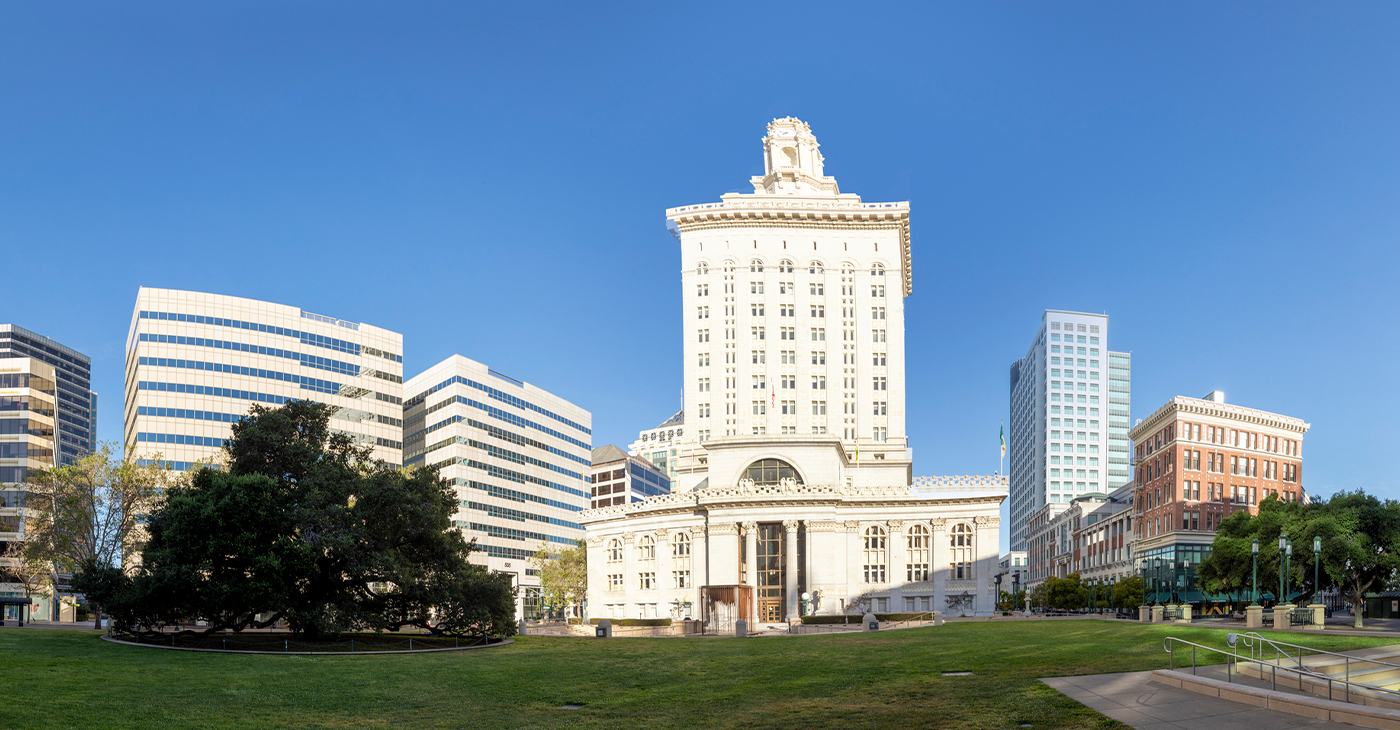City Government
Salario Mínimo de Oakland sube el 1 de enero
La Medida FF de Oakland, una medida electoral promulgada por los votantes aprobada en noviembre de 2014, ofrece aumentos anuales al Salario Mínimo de Oakland basada en los Precios locales al Consumidor (IPC).
A partir del 1 de enero la tasa se eleva a 30 centavos la hora, de $ 12.25 a $ 12.55.
La ley requiere que los empresarios informen a los empleados del aumento para diciembre 15. Para ayudar a los empleadores, socios de la Ciudad de Oakland serán los anfitriones de varios talleres en las próximas semanas.
La ciudad también ofrece carteles de notificación oficiales, que se pueden encontrar en el sitio web de la ciudad en: oaklandnet.com/minimumwage.
Muchas ciudades y estados de todo el país han promulgado leyes de salario mínimo para que los trabajadores pueden ganar un salario que les permita mantenerse a sí mismos y a sus familias.
Los votantes de Oakland rotundamente pasaron la Medida FF con una mayoría del 82 por ciento en noviembre pasado. A nivel regional, varias ciudades también han promulgado leyes de salario mínimo comparables a la Ciudad de Oakland.
“Estoy muy orgullosa de que en Oakland – una ciudad donde el 90 por ciento de las empresas locales tienen 20 o menos empleados – los dueños de negocios han aceptado el reto de conocer nuestros nuevos requisitos de salario mínimo”, dijo la alcalde de Oakland Libby Schaaf.
Bajo la ordenanza de Oakland, los empleados que realizan al menos dos horas de trabajo en una semana de trabajo en particular dentro de Oakland – incluyendo a tiempo parcial, los trabajadores estacionales y temporales – se les debe pagar al menos el salario mínimo.
Los otros beneficios estipulados por la Medida FF – incluyendo licencia por enfermedad y el pago de los cargos por servicios de trabajadores de la hostelería – siguen siendo los mismos que cuando la ley laboral entró en vigor el 2 de marzo de 2015.
Los empleadores están prohibidos de descarga, reduciendo la indemnización o de otro modo discriminar contra cualquier persona que presenta una queja ante la ley.
Para cumplir con la Medida FF, los empleadores de Oakland – y los empleadores cuyos empleados trabajan por lo menos dos horas en una semana de trabajo en particular en Oakland – deben comenzar a pagar a sus empleados $ 12.55 por hora el 1 de enero.
Además, los empleadores deben distribuir y prominentemente mostrar los avisos de la nueva tarifa de salario mínimo de $ 12.55 a los empleados para el 15 de diciembre. Las notificaciones deben estar en los idiomas hablados por más del 10 por ciento de los empleados.
Cada nuevo empleado al momento de la contratación también debe recibir el aviso de la nueva tarifa de salario mínimo.
Para ayudar a los empleadores, la Ciudad de Oakland ha proporcionado carteles de notificación en Inglés, chino, español y vietnamita para su descarga en: oaklandnet.com/minimumwage.
Un taller, Nuevas Leyes de Empleo de Mastering Oakland, será el jueves, 12 de noviembre desde las 10 am hasta el mediodía en Auditorio Sala 1, Oakland City Hall, 1 Frank H. Ogawa Plaza. El taller será presentado por el Centro de Desarrollo de Pequeños Negocios del Condado de Alameda y Wendel, Rosen, Black & Dean LLP.
Además, los consultorios jurídicos de negocio mensuales gratuitas y consultas para los empresarios o dueños de negocios que tienen preguntas legales son proporcionados por los Servicios Legales para Emprendedores, un programa del Comité de Abogados para los Derechos Civiles de la Bahía de San Francisco.
Para obtener más información sobre la clínica legal y asistencia técnica empresarial en general, póngase en contacto con el Centro de Asistencia Empresarial de la Ciudad de Oakland (BAC) en oaklandbusinesscenter.com, (510) 238 – 7952 o oaklandbac@oaklandnet.com.
También hay servicios para los empleados que creen que su empleador no está pagando el salario mínimo de los votantes por mandato y/o la prestación por enfermedad. Los empleados pueden contratar a un abogado para presentar una demanda contra su empleador o ponerse en contacto con la oficina de Contracts & Compliance de la Ciudad de Oakland al (510) 238-6258, o por correo electrónico: minwageinfo@oaklandnet.com. Para los que hablan español, llame al (510) 238-4728.
Para presentar una queja con la ciudad en español, visite oaklandnet.com/minimumwage y desplácese hacia abajo a los recursos para los empleados y hacer clic en Salario Minimo: Cuestionario Del Empleado y Declaración en Apoyo a su Queja. Después de la presentación de un formulario completo, un Oficial de Cumplimiento de Salarios Mínimos dará seguimiento.
Activism
Oakland Post: Week of December 25 – 31, 2024
The printed Weekly Edition of the Oakland Post: Week of December 25 – 31, 2024

To enlarge your view of this issue, use the slider, magnifying glass icon or full page icon in the lower right corner of the browser window.
Bay Area
Glydways Breaking Ground on 14-Acre Demonstration Facility at Hilltop Mall
Glydways has been testing its technology at CCTA’s GoMentum Station in Concord for several years. The company plans to install an ambitious 28-mile Autonomous Transit Network in East Contra Costa County. The new Richmond facility will be strategically positioned near that project, according to Glydways.

The Richmond Standard
Glydways, developer of microtransit systems using autonomous, small-scale vehicles, is breaking ground on a 14-acre Development and Demonstration Facility at the former Hilltop Mall property in Richmond, the Contra Costa Transportation Authority (CCTA) reported on social media.
Glydways, which released a statement announcing the project Monday, is using the site while the mall property undergoes a larger redevelopment.
“In the interim, Glydways will use a portion of the property to showcase its technology and conduct safety and reliability testing,” the company said.
Glydways has been testing its technology at CCTA’s GoMentum Station in Concord for several years. The company plans to install an ambitious 28-mile Autonomous Transit Network in East Contra Costa County. The new Richmond facility will be strategically positioned near that project, according to Glydways.
The new Richmond development hub will include “over a mile of dedicated test track, enabling Glydways to refine its solutions in a controlled environment while simulating real-world conditions,” the company said.
Visitors to the facility will be able to experience on-demand travel, explore the control center and visit a showroom featuring virtual reality demonstrations of Glydways projects worldwide.
The hub will also house a 13,000-square-foot maintenance and storage facility to service the growing fleet of Glydcars.
“With this new facility [at the former Hilltop Mall property], we’re giving the public a glimpse of the future, where people can experience ultra-quiet, on-demand transit—just like hailing a rideshare, but with the reliability and affordability of public transit,” said Tim Haile, executive director of CCTA.
Janet Galvez, vice president and investment officer at Prologis, owner of the Hilltop Mall property, said her company is “thrilled” to provide space for Glydways and is continuing to work with the city on future redevelopment plans for the broader mall property.
Richmond City Manager Shasa Curl added that Glydways’ presence “will not only help test new transit solutions but also activate the former Mall site while preparation and finalization of the Hilltop Horizon Specific Plan is underway.
Alameda County
Last City Council Meeting of the Year Ends on Sour Note with Big Budget Cuts
In a five to one vote, with Councilmembers Carroll Fife and Janani Ramachandran excused, the council passed a plan aimed at balancing the $130 million deficit the city is facing. Noel Gallo voted against the plan, previously citing concerns over public safety cuts, while Nikki Fortunato-Bas, Treva Reid, Rebecca Kaplan, Kevin Jenkins, and Dan Kalb voted in agreement with the plan.

By Magaly Muñoz
In the last lengthy Tuesday meeting of the Oakland City Council for 2024, residents expressed strong opposition to the much needed budget cuts before a change in leadership was finalized with the certification of election results.
In a five to one vote, with Councilmembers Carroll Fife and Janani Ramachandran excused, the council passed a plan aimed at balancing the $130 million deficit the city is facing. Noel Gallo voted against the plan, previously citing concerns over public safety cuts, while Nikki Fortunato-Bas, Treva Reid, Rebecca Kaplan, Kevin Jenkins, and Dan Kalb voted in agreement with the plan.
Oakland police and fire departments, the ambassador program, and city arts and culture will all see significant cuts over the course of two phases.
Phase 1 will eliminate two police academies, brown out two fire stations, eliminate the ambassador program, and reduce police overtime by nearly $25 million. These, with several other cuts across departments, aim to save the city $60 million. In addition, the council simultaneously approved to transfer restricted funds into its general purpose fund, amounting to over $40 million.
Phase 2 includes additional fire station brownouts and the elimination of 91 jobs, aiming to recover almost $16 million in order to balance the rest of the budget.
Several organizations and residents spoke out at the meeting in hopes of swaying the council to not make cuts to their programs.
East Oakland Senior Center volunteers and members, and homeless advocates, filled the plaza just outside of City Hall with rallies to show their disapproval of the new budget plan. Senior residents told the council to “remember that you’ll get old too” and that disturbing their resources will only bring problems for an already struggling community.
While city staff announced that there would not be complete cuts to senior center facilities, there would be significant reductions to staff and possibly inter-program services down the line.
Exiting council member and interim mayor Bas told the public that she is still hopeful that the one-time $125 million Coliseum sale deal will proceed in the near future so that the city would not have to continue with drastic cuts. The deal was intended to save the city for fiscal year 2024-25, but a hold up at the county level has paused any progress and therefore millions of dollars in funds Oakland desperately needs.
The Coliseum sale has been a contentious one. Residents and city leaders were originally against using the deal as a way to balance the budget, citing doubts about the sellers, the African American Sports and Entertainment Group’s (AASEG), ability to complete the deal. Council members Reid, Ramachandran, and Gallo have called several emergency meetings to understand where the first installments of the sale are, with little to no answers.
Bas added that as the new Alameda County Supervisor for D5, a position she starts in a few weeks, she will do everything in her power to push the Coliseum sale along.
The city is also considering a sales tax measure to put on the special election ballot on April 15, 2025, which will also serve as an election to fill the now vacant D2 and mayor positions. The tax increase would raise approximately $29 million annually for Oakland, allowing the city to gain much-needed revenue for the next two-year budget.
The council will discuss the possible sales tax measure on January 9.
-

 Activism4 weeks ago
Activism4 weeks agoOakland Post: Week of November 27 – December 3, 2024
-

 Activism2 weeks ago
Activism2 weeks agoButler, Lee Celebrate Passage of Bill to Honor Congresswoman Shirley Chisholm with Congressional Gold Medal
-

 Activism2 weeks ago
Activism2 weeks agoPost News Group to Host Second Town Hall on Racism, Hate Crimes
-

 Activism2 weeks ago
Activism2 weeks agoDelta Sigma Theta Alumnae Chapters Host World AIDS Day Event
-

 Business2 weeks ago
Business2 weeks agoLandlords Are Using AI to Raise Rents — And California Cities Are Leading the Pushback
-

 Activism3 weeks ago
Activism3 weeks agoOakland Post: Week of December 4 – 10, 2024
-

 Arts and Culture1 week ago
Arts and Culture1 week agoPromise Marks Performs Songs of Etta James in One-Woman Show, “A Sunday Kind of Love” at the Black Repertory Theater in Berkeley
-

 Activism2 weeks ago
Activism2 weeks agoOakland Post: Week of December 11 – 17, 2024
























































